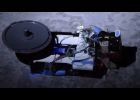Flusser’s Sonic Modernity
This chapter addresses Flusser’s often neglected writings on music and sound as they relate to his understanding of modernity. Taking two lectures ‘On Music’ and ‘On Modern Music’ given in Sao Paolo in 1965 as its departure point, Flusser’s conceptualization of a sonic modernity is examined within his ‘communicological’ theory. Contrary to a McLuhanesque media theory of the auditive, I argue Flusser’s theorization is distinct due to his characteristic ‘groundlessness’ and seeks to destabilize, rather than restabilize, a liberal Western humanist modernism.
5. Zoosystematica profundorum – Experimental Studies in Deep Sea Communication
The installation Varia Zoosystematica Profundorum models a specific notion of how deep sea communication between specimens and across species might happen, inspired by the work of zoosystematicien Louis Bec and philosopher Vilém Flusser. The video of the installation featured here, is a documentary of the version of the installation shown at the Singuhr Hörgalerie, Großer Wasserspeicher in Berlin, during the SuperCollider conference in Berlin in 2010.
Interwiev with Sam Auinger. On Flusser, Music and Sound
Auditory Projections
The Dimension of Sound in Flusser
The dimension of sound has long been considered completely missing from Flusser's thought, thus most Flusser research has not dealt with the auditive in his work so far. This article has a two-fold approach to counter this common perception; firstly, by looking at three (German) texts in which Flusser deals with music and sound directly – “Chamber Music”, “The Gesture of Listening To Music” and “Hörigkeit/Hoerapparate”, and secondly by looking at Flusser's key text “Crisis of Linearity” which largely ignores sound. The former tackles these lesser known texts to examine how Flusser actively (though rarely) applied music and sound in his work, whilst the latter uses methods of sound studies to critique the absence of sound in his important media-philosophical thesis. Flusser's writings on music and sound are both striking for the contemporaneity yet problematic for their demoded appearance of concepts such as “pure music”. Insights from contemporary sound studies question the dominance of the visual in Flusser's work and the epistemological consequences this might have.

